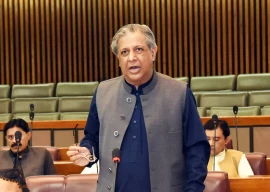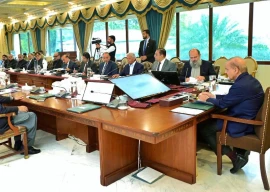
ISLAMABAD: Pakistan has called for the immediate cessation of drone strikes that violate the territorial integrity and sovereignty of states.
Speaking at the UN General Assembly, Pakistan’s Ambassador Dr Maleeha Lodhi condemned the continued use of drones and described the strikes as blatant disregard of existing international commitments on the use of remotely piloted aircraft.
She highlighted the recognition by member states of the notion that counter terrorism measures violating territorial integrity and sovereignty of states can be counterproductive and also fuel violent extremism.
Ambassador Lodhi’s speech followed the adoption by the 193-member world body of the resolution on the UN Global Counter Terrorism Strategy. This condemnation comes a fortnight after the one by Pakistan’s envoy in the UN Security Council. According to a press release, during the negotiations of the resolution that spanned over a month, Pakistan made “strenuous efforts to further strengthen international commitments regarding illegal drone strikes and their impacts”.
Ambassador Lodhi emphasised that the conclusions and recommendations of the report of the Human Rights Council on the use of drones was the “first step in the right direction”. The Pakistani envoy welcomed the consensus on the resolution, which she said served as a strong signal against the scourge of terrorism.
She also appreciated a renewed focus on the preventive approach to terrorism, which included addressing the root causes of terrorism as well as the internal and external drivers of violent extremism.
For Pakistan, Ambassador Lodhi said, such an approach was closely linked to promoting a culture of peace.
The UN Declaration and Plan of Action – now included in the resolution at Pakistan’s initiative – stresses the need to resolve protracted conflicts, ensure full realisation of the people’s right to self-determination and addressing xenophobia and all forms of discrimination on the basis of religion, culture and ethnicity.
Last month, Pakistan’s envoy Tehmina Janjua had urged the UN Human Rights Council to respond to loss of lives, human rights violations and breach of its territorial sovereignty because of drone attacks – the latest one taking out Afghan Taliban chief Mullah Mansoor in May.
The strike has once again strained Pak-US ties with Islamabad terming the attack a ‘violation of sovereignty’ and the US vowing to continue targeting terrorists on Pakistani soil. There have been 424 drone attacks in Pakistan between 2004 and 2016, according to the Bureau of Investigative Journalism, with 373 strikes coming under the Obama administration. At least 2,500-3,000 casualties have reported in these strikes, of which at least 350-420 are said to be civilians.
A White House report released on July 1 claimed US drones killed only 64 to 116 civilians in 473 strikes launched between January 20, 2009 and December 31, 2015 in areas ‘outside of active hostilities’, which include Pakistan, Yemen, Libya and Somalia. Afghanistan, Iraq and Syria were excluded in the report.
Published in The Express Tribune, July 3rd, 2016.


































































COMMENTS (1)
Comments are moderated and generally will be posted if they are on-topic and not abusive.
For more information, please see our Comments FAQ